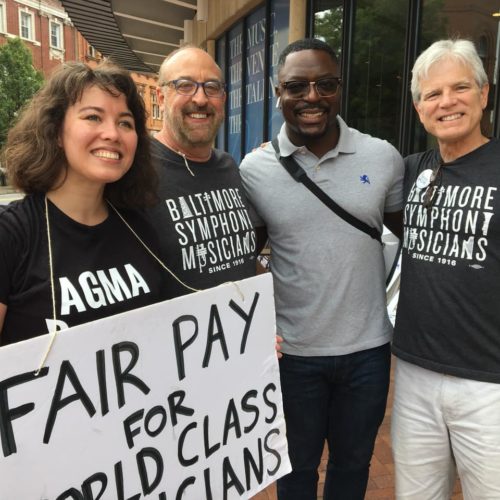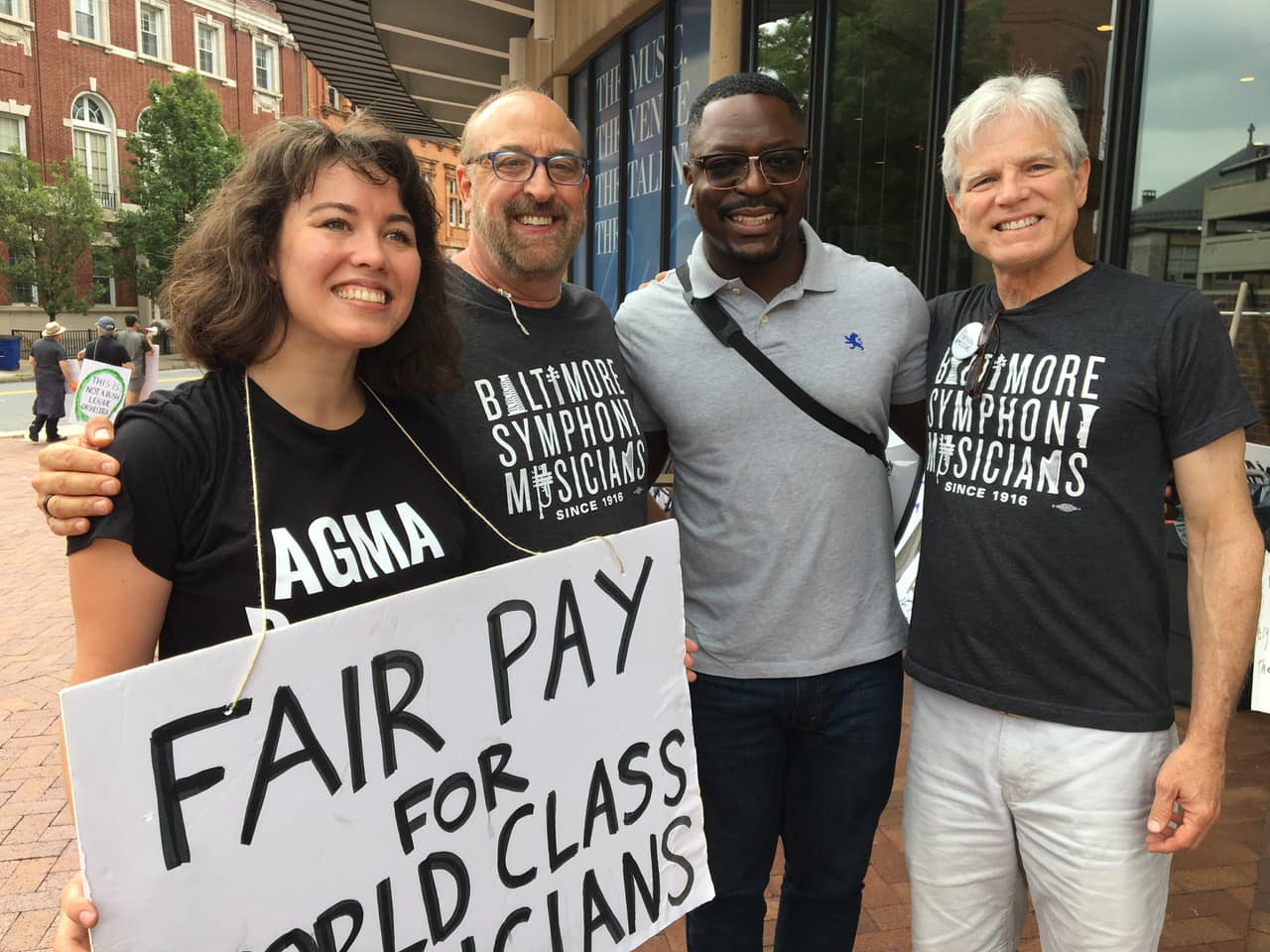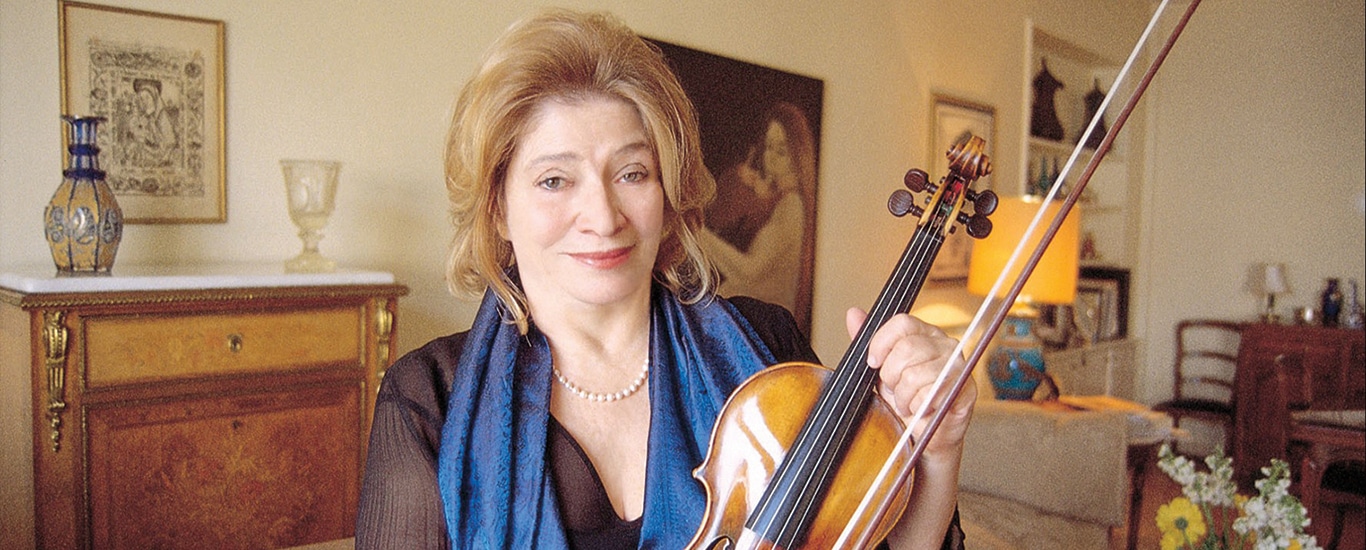Bitter winter looms in Baltimore
mainSo confident were the board of the Baltimore Symphony Orchestra of the musicians’ capitulation that they had Meyerhoff hall spruced up for the new season opening this weekend.
But the players today voted down two humiliating deals – a one-year, 40-week contract on slightly lower pay and an extension of the previous, lapsed contract until Christmas. After a three-month lockout, the players won’t buying turkeys.
So it’s down to the mattresses, and the mood’s turning sour.
Here’s a letter in today’s Baltimore Sun:

The announcement of the breakdown in the Baltimore Symphony Orchestra’s contract negotiations is a terrible development for our 104-year-old orchestra and its superb musicians (“BSO musicians file labor complaint, return to picket line,” Sept. 10).
It constitutes an utter disgrace on the part of the BSO’s board of directors and management — absolutely the worst such “leaders” in my 44 years as a BSO subscriber — who clearly all along were determined to destroy the first-class orchestra that conductors Sergiu Comissiona, David Zinman, Yuri Temirkanov and Marin Alsop lovingly created in the past half-century.
Forever shame on the current board and management. They should be driven out of town!”
Charles E. Walker, Baltimore






Being a subscriber is great – but it’s not enough. It takes much more generous giving than the average person can give. And Baltimore needs to find $40m somewhere – and after that first deep pocket, a second, a third, etc. – to keep this thing going. But, as a concertgoer myself – I’m always amazed orchestras continue to find people with that kind of money coming forward. I love orchestral music a lot, but I’m with the average person – I don’t have the funds… so I do worry about the future. Other people have to keep this “hobby” alive for me…
Finally, a lucid and honest concert goer!
That’s right, ALL classical music tickets are subsidized, whether it’s Balitmore or Salzburg, $10 dollar seats or $800 seats, someone else is paying a part of your ticket, whether they are private donors or the state (i.e., your fellow tax payers)
Classical music is welfare! (“welfare” in the American sense of the word, i.e., public assistance for the poor)
I give 20% of my income in taxes to, in large part, subsidize welfare for the poor. Its not voluntary. So, if rich people want to voluntarily give money to subsidize an orchestra season, which I also enjoy, I say “thank you”. Has anyone ever thanked me for helping to subsidize their food stamps, education, shelter, scholarships, etc?
Thank you for your undying, unconditional support Mr. Guest……
A symphony orchestra is a polished, organized busking operation. I say this as someone who works in the American model. If your ticket revenue covers 40% of your operating budget, you are on the better side of average for the major symphonies. I’ve long believed the future of classical music is bright. The future of the symphony model… that I’m not as bullish on.
One wonders how much money Mr. Walker donates annually to the Baltimore Symphony. He describes himself as a “subscriber” but not a contributor.
As someone who subscribes but perhaps has no additional funds to spend, is he not entitled to his justifiable outrage??
Perhaps he is entitled to justifiable sorrow. (I still mourn the demise of the Baltimore opera.). But raging against the realities of trying to keep an orchestra going in a city whose changing demographic finds it increasingly irrelevant is unjustified entitlement.
The demographics outside of the city are quite “good” for the BSO. Thats where they will find their support.
The Demographics of the Baltimore suburbs are not unlike Cleveland, a similarly distressed city that somehow has managed to successfully keep the orchestra funded.
Maybe if the management of Baltimore looked to examples like Cleveland instead of taking the route of blaming the musicians for their problems, they wouldn’t be in this mess. But that would mean they wold have to admit that they haven’t been doing their job.
The bottom-line question here: Does the BSO have enough audience (“fannies in the seats,” to borrow the name of a music industry blog) to support a 52-week season?
IIRC, some years ago the St Louis Symphony went through this same sort of crisis. In the end the season *was* reduced (dunno if it was all the way down to 40 weeks) – and the management agreed to pay the players during the “off” weeks what they would get if they filed for unemployment. I don’t know if that’s still in effect or if the StLO later bumped up the season length again.
BUT this is reality: even really large cities like Chicago have some trouble keeping an orchestra busy 52 weeks a year. People have a lot more music “entertainment” choices now than, say, 75 years ago. Certainly, cultivating audience development can help – as it seems to have in Minnesota since the big lockout – when the players and management work together. The Minnesota Orchestra’s marketing campaigns have concentrated on their best assets: the orchestra players themselves.
… who clearly all along were determined to destroy the first-class orchestra …
Rank hyperbole like that makes this letter an unserious contribution to the discussion.
A pity, but Baltimore isn’t Minneapolis, or even Philadelphia. The city has way bigger problems and most of its residents have no remote involvement to the orchestra. I don’t see the sort of local sympathy it would take to make this break in the players favor.
Americans create a radical form of capitalism where the market is the sole arbiter of virtually all human endeavor, and then wonder why their arts institutions fail. The same socio-economic forces that have reduced much of Baltimore to a massive ghetto (like so many other US cities) are part of the same system that creates our dysfunctional, plutocratic arts funding system. The arts funded by and for the wealthy.
Orchestras that have declared bankruptcy during my career: San Diego, Miami, Kansas City, Albuquerque, Syracuse, Tulsa, San Antonio, New Orleans, Denver, San Jose, Colorado Springs, Honolulu, Miami, and Philadelphia, plus many others I can’t recall or don’t know about. And many more are in continual financial trouble. The American way.
You said Miami twice. Most of the orchestras in that list are still going, some under a different name. Its not capitalism. Its changing demographics, in every case.
No, it’s an American phenomenon. There is no comparison in the number of orchestral bankruptcies under the EU system of social democracy and its public arts funding. (And don’t bring up the orchestral closings after German unification, which was an entirely different circumstance.)
As for Miami, it’s a city with a metro area of 5.5 million but it does not have a professional symphony orchestra. There is nothing in Europe even remotely like that. Only in America.
An abundance of pops concerts, and “Movies With Orchestra” shows has apparently not helped their bottom line. After the free preview event, The first three concerts listed on the BSO website are consecutive performances of “The Empire Strikes Back”.
If these concert don’t draw paying audiences, what will?
Good point. More than once I’ve had a free night to go to the BSO or NSO and the pops crap was all that was available. Didn’t go. But, I was under the impression attendance was pretty good for pops.